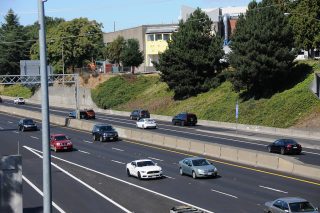— Written by Shawn Fleek (OPAL Environmental Justice Oregon), Mary Peveto (Neighbors for Clean Air), and Anaïs Tuepker (350PDX).
In 2017, the nascent No More Freeways coalition published an editorial in The Oregonian asking elected officials for an honest reassessment of the Oregon Department of Transportation (ODOT)’s plans to spend hundreds of millions of dollars to expand the Rose Quarter Freeway in North Portland.
Since then, headlines over the last eighteen months have only confirmed that this is a gravely misguided project.

(Photo: Jonathan Maus/BikePortland)
Last March, the Portland Mercury reported ODOT’s own consultants concluded the Rose Quarter freeway expansion wouldn’t have any discernible impact on congestion. This finding may be counterintuitive, but it is a textbook example of the concept of “induced demand,” a phrase transportation planners use to describe the phenomenon in which more lanes of freeways only lead to more eager motorists electing to drive. The Mercury also reported that, despite requests from advocates and elected officials, ODOT has refused to study whether decongestion pricing initiatives could solve the corridor’s gridlock by itself, without wasting hundreds of millions on a widening project that does nothing to reduce congestion.
Secondly – as a result of induced demand, our community will suffer from worse air quality and pollution. In May, the Willamette Week detailed the alarmingly poor air quality at Harriet Tubman Middle School. Researchers suggested students should avoid outdoor recess, and yet ODOT plans to literally expand I-5 into the backyard of the newly-reopened school. The latest studies on air pollution are grim – poor air quality is linked to lung disease, poor student performance, heart disease, dementia and diabetes. ODOT speaks to the importance of healing the Albina neighborhood’s scars from urban renewal, but it is impossible to heal these scars by further polluting air near children’s classrooms. Speaking of public health, ODOT has tried to sell the freeway widening as a safety project. But last October, Willamette Week punctured these phony claims, concluding that the stretch of freeway in question hasn’t seen a traffic fatality in over a decade. Meanwhile, ODOT’s regional arterials remain shockingly dangerous and deadly.
Advertisement
Finally, squandering half a billion dollars widening a mile of freeway is an egregious form of reckless climate denialism. We’ve all felt the unease that permeates our communities when our neighborhoods are cloaked with the wildfire smoke that has draped itself through the Willamette Valley three of the past four summers. October’s IPCC report warned that phasing out fossil fuels in eleven years was essential to avoiding the destruction of society as we know it. Last month’s reporting by The Oregonian suggests that even with passage of pending carbon legislation, Oregon won’t hit carbon reduction targets without fundamentally reducing emissions from private automobiles. It is frustrating to watch self-proclaimed environmentalists in City Hall and Salem champion freeway expansion when 40% of Oregon’s carbon emissions come from transportation. The hurricanes, fires and floods are only growing stronger. Expansion of this freeway represents a complicit willingness to ignore Oregon’s responsibility to future generations and the planet.
Future headlines will only make it more self-evident that spending billions on freeway expansions across the region is a wholly inappropriate use of taxpayer dollars given the daunting challenges Oregon faces. We encourage Oregonians committed to cost-effective governance, our children’s lungs and the planet our children will inherit to join us in submitting testimony to ODOT during this Public Comment period.
— Shawn Fleek is the Director of Narrative Strategy at OPAL Environmental Justice Oregon, Mary Peveto is the Executive Director of Neighbors for Clean Air, and Anaïs Tuepker is the Lead for Organizational Resilience at 350PDX. Learn more at www.nomorefreewayspdx.com.
Never miss a story. Sign-up for the daily BP Headlines email.
BikePortland needs your support.

